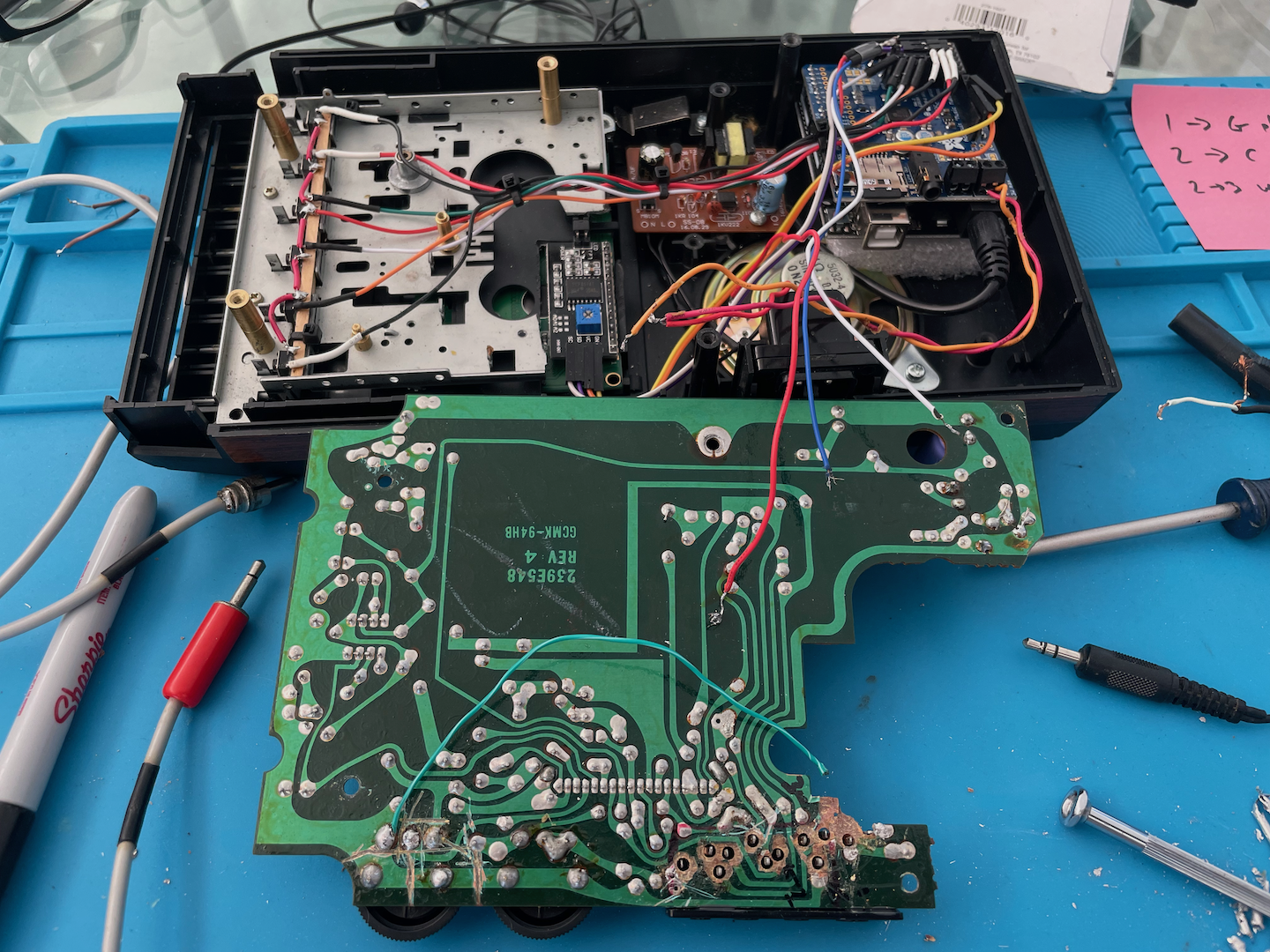KCS to create .WAV files?
61 views
Skip to first unread message
Mike Ladwig
Apr 3, 2022, 3:07:05 PM4/3/22
to SEBHC
Hello. Wondering if anyone has any experience creating .WAV files for the H8 cassette audio interface from .H8T files using the KCS utility ( https://github.com/privatezero/KCS ) I'm slowly getting somewhere, but thought I'd see if there were any experts around.
Thanks!
Joseph Travis
Apr 5, 2022, 9:37:20 AM4/5/22
to se...@googlegroups.com
Hi Mike,
I'm guessing by the deafening silence that you are now the de facto expert on the subject. I did click on the link and read the info there, it's interesting. I can see a benefit to those who may be interested in preserving / archiving program tapes as opposed to using modern media. I believe the current trend within the group is toward preserving the tape programs in the H8T format and to use a modified H8-5 interfaced to a computer for reliable transfers. What is your experience and/or plans with the KCS utility?
Regards,
Joe Travis n6ypc
On Sun, Apr 3, 2022 at 3:07 PM Mike Ladwig <mdla...@gmail.com> wrote:
Hello. Wondering if anyone has any experience creating .WAV files for the H8 cassette audio interface from .H8T files using the KCS utility ( https://github.com/privatezero/KCS ) I'm slowly getting somewhere, but thought I'd see if there were any experts around.Thanks!
--
You received this message because you are subscribed to the Google Groups "SEBHC" group.
To unsubscribe from this group and stop receiving emails from it, send an email to sebhc+un...@googlegroups.com.
To view this discussion on the web visit https://groups.google.com/d/msgid/sebhc/798a352d-92b0-45a2-8ac4-6c8102344692n%40googlegroups.com.
Glenn Roberts
Apr 5, 2022, 9:44:12 AM4/5/22
to se...@googlegroups.com
If you get this working I have a program atoh which converts .ABS files to .H8T format. This would let us use HDOS to compile or assemble programs and ultimately generate a .WAV. I presume the main value of your exercise would be to do an accurate demonstration of an early tape-based system?
Sent from my iPad
On Apr 3, 2022, at 9:07 PM, Mike Ladwig <mdla...@gmail.com> wrote:
Hello. Wondering if anyone has any experience creating .WAV files for the H8 cassette audio interface from .H8T files using the KCS utility ( https://github.com/privatezero/KCS ) I'm slowly getting somewhere, but thought I'd see if there were any experts around.Thanks!--
Mike Ladwig
Apr 5, 2022, 9:01:12 PM4/5/22
to SEBHC
Hi all. I got it to work today, at least on one test .H8T file. Yay!
After (of course) trying almost everything else first, the trick is that KCS is creating wav files with a much higher volume than the wav files in the 885-1009_tape-I archive, so I had to lower the output volume in the playback device. The square wave output sounds quite different than the "natural" wav files in the archive, so it is hard to do by ear. I used a Mac -based spectrum visualization tool to help.
The recipe is regular mode (not CUTS), 1200 baud. None of the other settings yet, although I'm hopeful that some of the less documented ones will let me tweak the output volume or I can find another automated way to do it.
The command (running in DOSBOX on a Mac) is:
KCS -M -B2 CHASELED.H8T CHASELED.WAV
I want to preserve as much of the functionality, appearance, and user feel of the original equipment as possible. My goal is no modern gear visibly involved. I've built a Arduino -based audio system inside a period-appropriate cassette deck, using it's original functionality -- the deck control buttons and audio/power jacks. The only visible difference is an LED display built into the space where the cassette would normally go to select files with the deck buttons. This lets me replace just the slowly dying magnetic media and keep the original audio interface including the old cables to the computer. It's working for my H8 so far, tweaking for the IMSAI/Tarbell and TRS-80 cassette systems in my collection is next.
Next, I might think about doing the same thing to replace floppy media. Very hard to imagine 8" floppies are going to last forever -- some of my 5" Northstar distribution disks flaked into a big mess a couple of years ago.
Regards,
mike.
Joseph Travis
Apr 5, 2022, 9:46:19 PM4/5/22
to se...@googlegroups.com
Very cool! Just outta curiosity, how does the .WAV file size compare with the H8T file size?
Regards,
Joe Travis n6ypc
To view this discussion on the web visit https://groups.google.com/d/msgid/sebhc/e74d6955-d551-4f52-826e-842b5f88fda2n%40googlegroups.com.
Glenn Roberts
Apr 6, 2022, 12:06:10 AM4/6/22
to se...@googlegroups.com
Mike: I think you showed a picture of your modified cassette deck before, but I am interested in how you modified it internally to add switches to the mechanical buttons. I would be interested in doing something similar, though I would have the Pi/Arduino play a digital (.H8T) signal. Great preservation work!
For replacing 8” disk drives perhaps something like the Semi-Virtual Drive (SVD) or GoTek approach?
Sent from my iPad
On Apr 6, 2022, at 3:01 AM, Mike Ladwig <mdla...@gmail.com> wrote:
Hi all. I got it to work today, at least on one test .H8T file. Yay!
To view this discussion on the web visit https://groups.google.com/d/msgid/sebhc/e74d6955-d551-4f52-826e-842b5f88fda2n%40googlegroups.com.
Mike Ladwig
Apr 6, 2022, 12:10:44 AM4/6/22
to SEBHC
For CHASELED, H8T @ 1518 bytes, WAV @ 520929 bytes. Not efficient, but even a cheap sdcard will hold way more audio than I'll need to store...
Mike Ladwig
Apr 6, 2022, 12:25:50 AM4/6/22
to SEBHC
Here's an early picture. Little pushbuttons JD welded to a wood stick to locate them the correct distance from the pushbutton levers.
If I can get it to fit in the Arduino memory footprint, I'd like to be able to generate the .wav files from H8Ts on the sdcard.
I haven't even started thinking of an approach to the floppy, other than that I want it to retain the electromechanical bits that make authentic noises. Those floppy stepper motor sounds are pretty cool.


Reply all
Reply to author
Forward
0 new messages
